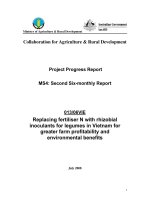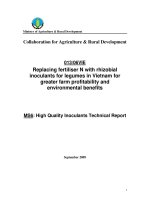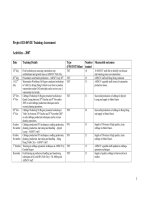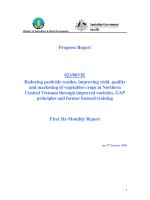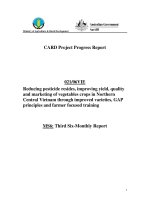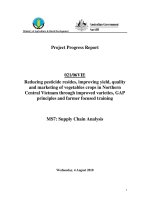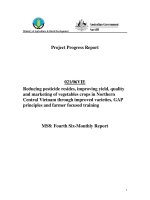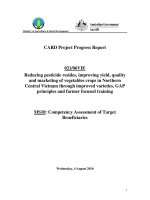Báo cáo khoa học nông nghiệp " Extending export opportunities to smallplot dragon fruit growers through Good Agricultural Practices - Milestone 6 " pot
Bạn đang xem bản rút gọn của tài liệu. Xem và tải ngay bản đầy đủ của tài liệu tại đây (2.88 MB, 43 trang )
Extending export opportunities to
small-plot dragon fruit growers
through Good Agricultural Practices
Campbell J, Nguyen Van Hoa, Nguyen Huu Hoang, Rankin M K
May 2010
A report prepared for:
Hassall and Associates International
Campbell J
Plant & Food Research, Nelson
Nguyen Van Hoa, Nguyen Huu Hoang
Southern Horticultural Research Institute, Vietnam
Rankin M K
Young Professional, CARD, Hanoi, Vietnam
SPTS No. 4008
PFR Client Report No. 25657
PFR Contract No. 22663
DISCLAIMER
Unless agreed otherwise, The New Zealand Institute for Plant & Food Research Limited does not give any prediction, warranty or
assurance in relation to the accuracy of or fitness for any particular use or application of, any information or scientific or other result
contained in this report. Neither Plant & Food Research nor any of its employees shall be liable for any cost (including legal costs),
claim, liability, loss, damage, injury or the like, which may be suffered or incurred as a direct or indirect result of the reliance by any
person on any information contained in this report.
This report has been prepared by The New Zealand Institute for Plant & Food Research Limited (Plant &
Food Research), which has its Head Office at 120 Mt Albert Rd, Mt Albert, Auckland.
This report has been approved by:
John Campbell
Scientist
Date:
Louise Malone
Science Group Leader, Applied Entomology
Date:
Ministry of Agriculture & Rural Development
Project Report
0029/07/VIE
Extending export opportunities to small-plot
dragon fruit growers through Good Agricultural
Practices
Expansion of Pilot Model
Milestone 6
Due November 2009
Contents
1 Institute Information 1
2 Executive Summary 2
3 Introduction & Background 2
4 Expansion of Pilot Model 6
4.1 Identification and progress in grower GAP and packhouse compliance in Binh
Thuan, Tien Giang and Long An Provinces 6
4.2 Documentation of fruit volumes, market access and returns to growers for new
packhouses and grower groups 14
4.3 Specific market information 15
5 Implementation & Sustainability Issues 16
5.1 Implementation 16
5.2 Sustainability 16
6 Next Critical Steps 17
7 Appendix 1 19
8 Appendix 2 MARD Certifying Body authority 20
9 Appendix 3 VietGAP Standard 21
10 Appendix 4 VietGAP Check list 22
11 Appendix 5 Email dated 30 November 2009 23
12 Appendix 6 Email to Mr Long from Dr Hoa 25
13 Appendix 7 Long An Co-op info collected from the meeting on 3 November
2009 26
14 Appendix 8 Dragon fruit farm data survey compliance GlobalGAP Standard
in Chau Thanh, Long An 30
15 Appendix 9 Cost of GlobalGAP compliance certification 32
16 Appendix 10 Tien Giang outreach group information 34
17 Appendix 11 Farmer Training Status spreadsheet 37
Glossary
BRC British Retailers Consortium: Global Standard – FOOD
CARD Collaboration for Agriculture and Rural Development
CTU Can Tho University
DARD Department of Agricultural Research and Development
EUREPGAP Euro-Retailer Produce Working Group; Good Agricultural
Practice
GAP Good Agricultural Practice
GlobalGAP GLOBAL Good Agricultural Practice
HAI Hassall and Associates International
HCE Hue College of Economics
HCMC Ho Chi Min City
LAC Lead Auditor Course
MARD Ministry of Agriculture and Rural Development
MRL Maximum Residue Level
P&FR The New Zealand Institute for Plant & Food Research
PPD Plant Protection Division
SGS Société Générale de Surveillance
SOFRI Southern Horticultural Research Institute (formerly Southern
Fruit Research Institute)
UK United Kingdom
UKAS United Kingdom Accreditation Service
USA United States of America
VIETGAP VIETnam Good Agricultural Practice
WTO World Trade Organisation
Extending Export Opportunities to small-plot dragon fruit growers through Good Agricultural Practices Page 1
1 Institute Information
Project Name Extending export opportunities to small-plot
dragon fruit growers through Good Agricultural
Practices
Vietnamese Institution
Southern Horticultural Research Institute (formerly
Southern Fruit Research Institute)
Vietnamese Project Team Leader
Nguyen Van Hoa
Australian Organisation
The New Zealand Institute for Plant & Food
Research
Australian Personnel
John Campbell, Allan Woolf, Leonie Osborne and
Marlo Rankin
Date commenced
February 2008
Completion date (original)
February 2010
Completion date (revised)
Reporting period Expansion of Pilot Model
Contact Officer(s)
In Australia: Team Leader
Name:
John Campbell
Telephone:
+64 3 9073602
Position:
Project Leader
Fax:
+64 3 9073596
Organisation
Plant & Food Research
Email:
z
In Australia: Administrative contact
Name:
Mrs Leonie Osborne
Telephone:
+64 9 925 7232
Position:
Executive Assistant
Fax:
+64 9 925 8626
Organisation
Plant & Food Research
Email:
In Vietnam
Name:
Dr Nguyen Minh Chau
Telephone:
+84 73 893 129
Position:
Project Champion
Fax:
+84 73 893 122
Organisation
Southern Horticultural Research Institute
Email:
Page 2
Extending Export Opportunities to small-plot dragon fruit growers through Good Agricultural Practices
2 Executive Summary
Expansion of the Binh Thuan dragon fruit project pilot model to the farmers, packers
and exporter in the wider Binh Thuan, Tien Giang and Long An Provinces has made
significant progress during this project (Output 1.2). Contributing factors to that
progress include:
• An efficient, GlobalGAP certificated pilot of farmer, packer and exporter as the
“model” for replication
• A highly proficient national team of quality practitioners to deliver the
technology transfer and generic documentation to self motivated groups and to
individuals and new groups wishing to develop GAP quality systems for dragon
fruit and other crops
• The rapid and sustainable expansion in volume of compliant stakeholders
• The global need for “Safe, Legal and Quality” produce and the subsequent
market driven compliance standards requirement to enable access to those
markets
• Excellent publicity for the adoption of GAP principle’s and for the practical
work being undertaken
• A trend within the Vietnam horticultural industry to get behind the GAP
programme to receive the benefits of safe food, safer homes/living for the
producers, through GAP implementation, accountability and environmental
awareness.
SOFRI and the dragon fruit projects have built a strong foundation for the countrywide
GAP initiative in a sustainable way and SOFRI and the country’s horticulture industry
are responding to the wider needs of the initiative as expansion momentum grows.
The dragon fruit project expended considerable energies throughout both projects to
encourage farmers and packers to adopt GAP but the decision to implement GAP lies
with the individual. The project team has been resolute in its drive to implement GAP:
many farmers and packers have received training, improved their operations and/or
gone on to achieve GlobalGAP or VietGAP certification (Appendix 1).
The project has found great difficulty in gathering reliable data necessary to document:
fruit volumes; market access; and returns to growers; for existing and new packhouses
and grower groups. Some marketing information has been included in this report but it
has been beyond the resources of the project to accurately determine the impact of the
project.
3 Introduction & Background
Producers of dragon fruit in Vietnam have seen prices for their fruit decline by about
60% since 2000, which can be attributed, in part, to their dependence on local and
nearby exports. There are about 10 major exporters in Vietnam but a significant portion
of the total production is sourced from many small-holder growers. During the previous
dragon fruit GAP project 037/04VIE, growers were evaluated through a benchmarking
Extending Export Opportunities to small-plot dragon fruit growers through Good Agricultural Practices Page 3
study to determine the status of the dragon fruit producers against the standards required
by high value export markets. The project then proceeded to implement documented
quality systems, training and mentoring in a “Pilot” of exporter, packer, and large and
small-holder dragon fruit farms that met the standards of BRC Global – Food Issue 5 in
the packhouse and GlobalGAP on the farms. The established “working quality model”
is now testing the high value markets of the United Kingdom, Europe and the USA.
This project, “Extending export opportunities to small-plot dragon fruit growers through
good agricultural practices”, is attempting to complete the linkages with the high value
markets, consolidate the pilot establishment to ensure sustainability, provide expansion
of the pilot operation and establish new commercial dragon fruit operations in the Binh
Thuan, Tien Giang and Long An provinces. Large and increasing numbers of small-plot
growers will have the opportunity to access high monetary value markets for their
dragon fruit.
The project objectives are documented in the periodic progress reports.
Project outreach delivery
Pre-project vision
• Completion and maintenance of the Hoang Hau dragon fruit pilot model in Binh
Thuan. GlobalGAP Certification achieved for the farmer group, packer and
exporter
• To replicate the first dragon fruit project pilot process in the Tien Giang and
Long An Regions
• Introduce entrepreneurial exporters to create momentum and market linkages on
farmer owning crop to market/exporter on commission basis
• To return increased dragon fruit sales revenue back to farmers from high value
markets
• SOFRI dragon fruit team to migrate from doing complete development of small-
holder farmers; to passing the mantle to the exporter/cooperatives leadership; to
providing expert support to industry; ultimately charging for services to assist
SOFRI to implement the Decree 115 directive
• Build up the foundation and capability within SOFRI for consultancy and
technical backstopping, based on good science, to the horticultural industry
• Utilise the stimulation of increased revenue to the farmers from certificated fruit
to high value markets to provide outreach programme expansion momentum.
Project delivery
The most significant dragon fruit project achievements relative to this report are in the
areas of human resource and infrastructure development. This, and the previous dragon
fruit project, has intentionally prioritised the development of the foundation and
appropriate infrastructure and skills for Vietnam’s GAP quality horticulture initiative.
This should ensure it has the best chance of meeting the needs of a market driven export
industry, which can improve the livelihoods of small-holder dragon fruit farmers
through access to high value markets.
At the commencement of the dragon fruit project, a very ambitious programme of
outreach was planned, particularly for the provinces of Tien Giang and Long An.
Although good and sustainable progress has been made during this period of reporting,
there is a time lag between what was envisaged in the outreach programme and what
has been actually achieved. During this period, the writers expected to be able to report
Page 4
Extending Export Opportunities to small-plot dragon fruit growers through Good Agricultural Practices
that farmers, packers and exporters were taking full responsibility for making the
market driven GAP changes thus reducing the demand on the SOFRI dragon fruit team.
However, although good progress has been achieved, GAP development still requires a
considerable effort by SOFRI specialists.
Progress constraints have been identified and corrective action is being implemented to
allow the outreach programme to gather momentum as planned. Those constraints
include:
• Project personnel time and resources committed to the upgrading of operation
manuals demanded by the shift from EurepGAP to GlobalGAP and to meet
compliance with the new GlobalGAP standard; also the BRC standard upgrade
from Issue 3 to Issue 5. Operation Manuals compliant to the upgraded standards
have now been completed
• Delays caused by farmer reluctance to progress towards GAP implementation
owing to possibility of receiving resource support through provincial project
funding. Provincial GAP project possible resource availability has been
communicated but is not yet available. A rapid increase in the uptake of GAP by
small-holder dragon fruit farmers is expected when resources become available
• A significant amount of time is taken by the professional quality practitioners to
ensure GAP technology transfer targets only those operators who are serious
about meeting their chosen standard requirements.
National capability and project sustainability achievements of note include
• Trained and qualified SOFRI quality practitioner personnel to lead the GAP
changes:
o 1 New Zealand Organisation for Quality Trained and Certificated
Internal Auditor: who subsequently, with the assistance of the project
leader, presented the Internal Auditor course to SOFRI science personnel
o 35 people were trained and Certificated as Internal Auditors; also 29
received HACCP training and Certification; and 21 received Farm Safety
Working and Primary Emergency Aid training and certification by SGS
Vietnam to global standards. Both SOFRI and private sector personnel
received training. The lists of people attending the various courses
appear in the dragon fruit project Milestone 5 report (Refer to Appendix
1 in this report for Farmer training and DF team involvement)
o Two people were trained for the Certificated Lead Auditor Course (LAC)
by SGS Vietnam: this requires the completion of practical application to
the standard of United Kingdom Accreditation Service (UKAS) prior to
full certification
o Approval by MARD for SOFRI to be a Certifying Body for the VietGAP
Standard: using the two LAC operators to undertake external audits and
approve certification (Refer to Appendix 2 in this report for signed
Vietnam document)
o Qualified project personnel provide high quality GAP training to
farmers, packers and exporters: VietGAP and GlobalGAP for farmers
and GlobalGAP on-farm packing, BRC and specific market standards for
packers and exporters
o Although the emphasis is on dragon fruit, several other horticultural
crops are addressed in the quality initiative using the trained quality
practitioners.
Extending Export Opportunities to small-plot dragon fruit growers through Good Agricultural Practices Page 5
• Infrastructure developed by project personnel and project initiation (SOFRI):
o Project personnel involved in policy decisions/making at Government
level
o Project personnel taking a lead role in the development of the VietGAP
Standard (see Appendix 3, photo of standard cover, hard copy plus
electronic version)
o Project personnel invited to develop VietGAP Standard and training
materials for all fruit of Vietnam, includes the VietGAP auditing check
list development (Appendix 4 check list)
o GAP supportive services have been developed: registered facilities for
the analysis and monitoring of soils, plant material, water quality, etc.
Diagnostic, applied research, problem solving, etc.
o Market linkages between farmers, packer and exporters
o Centre of excellence at SOFRI to provide high quality standard technical
services and support to industry and strong working relationship with
SGS Vietnam.
Linking packers with exporters
Note: SGS is a world-wide quality operation, which operates at the same level globally.
SGS Vietnam is supported, mentored and monitored by SGS New Zealand, who verify
all certification audits and authorise the issuance of Certificates of Compliance by SGS
Vietnam.
Benefits from the achievements include
• High quality training and support for the evolving GAP initiative in Vietnam at
all levels. Great care is taken to ensure recipients of training are most likely to
have the integrity to implement the selected quality standards, fully and honestly
• A private sector GAP capability in dragon fruit and other crops that has every
chance of being sustainable in the future
• A private GAP horticulture sector which is aware of the high value market
standards and the serious need to rigorously comply with the standards as a
prerequisite to accessing and maintaining high value markets
• Credibility for the Southern Horticultural Research Institute for its lead role in
the dragon fruit quality initiative:
Page 6
Extending Export Opportunities to small-plot dragon fruit growers through Good Agricultural Practices
o At the provincial and country level for Quality Standards implementation
and development
o In the Southeast Asian Region through quality practitioner presentations
at meetings and conferences
o Globally for systems and processes which ensure product compliance to
access sophisticated, demanding and expanding markets, and for the
fulfilment of WTO obligations
o Systematic development of GAP in Vietnam’s horticulture industry in a
controlled way and prioritising sustainability.
4 Expansion of Pilot Model
4.1 Identification and progress in grower GAP and packhouse compliance in
Binh Thuan, Tien Giang and Long An Provinces
Specific project delivery for the project targeted provinces:
Binh Thuan
1. The Binh Thuan dragon fruit project pilot packhouse received compliance
certification for the GlobalGAP Standard (for a full account of the change of
standard at the pilot packhouse please refer to the project Milestone 5 report)
a. The project pilot packhouse continues to advance towards the BRC standard
under project team training, mentoring and Internal Auditing. This is
preparation for the commissioning of a new, large packhouse being
constructed
b. The pilot packhouse is very close to BRC compliance and has achieved
approval as a registered supplier to the USA
c. There were concerns regarding the pilot packhouse management’s
commitment to providing, training and retaining sufficient quality/qualified
people in key areas of the packhouse operations to reach and subsequently to
maintain BRC compliance. Too much reliance is being placed on one quality
leader only at the packhouse. Mentoring to mitigate this constraint has been
initiated and is continuing; the delay of implementing the BRC standard to
the new packhouse may/should assist to mitigate the human resource
constraints observed.
2. Update on the Ticay (Mr Long) on-farm packing, GlobalGAP Certificated,
packhouse facility in Binh Thuan:
a. It had been planned early in 2009 for the project to assist to elevate this
packhouse from GlobalGAP compliance to become certificated to the BRC
Standard
b. In spite of significant correspondence between the project and Ticay, no
progress has been reported to date
c. Constraints impeding progress are being identified and mitigated. This
component is only part of a wider association with Mr Li Hai Long of Ticay
– Bao Thanh Co. Ltd., which is also to address development of GlobalGAP
small-holder farms; on-farm compliant packing facilities and linkages with
high value markets in the provinces of Tien Giang and Long An (Appendix
5 email to Long).
Extending Export Opportunities to small-plot dragon fruit growers through Good Agricultural Practices Page 7
There is a DARD development programme in the Binh Thuan province introducing
Good Agricultural Practices to small-holder dragon fruit farmers to the MARD
VietGAP Standard, which was largely developed by the SOFRI dragon fruit team.
The Binh Thuan DARD GAP programme’s status includes:
• Stated target for 3000 small-holder dragon fruit farms operating at, and
certificated to, the VietGAP Standard, enabling access to the Chinese markets
• A target of some 125 groups, cooperatives and individual farms
• Approximately 350 farms are Certificated to VietGAP Standard
• Most training presented by the Binh Thuan DARD
• Auditing and Certificating also done by a separate section of the Binh Thuan
DARD (reported that auditors are separated from trainers)
• In the future, external auditing and certification will be undertaken by approved
Certifying Bodies such as SOFRI who have been involved in improvement of
this situation
• Some technical transfer has been provided by SOFRI staff.
Tien Giang
Background
In Cho Gao, district of Tien Giang province, a dragon fruit cooperative with ~20
members was set up in 2006 but there have been low levels of commitment. Dr Vo Mai
(Vinafruit) was originally involved in establishing the cooperative. In order to achieve
the objective of getting new farmers GlobalGAP certified, Mr Hoang made many visits
to the area and held discussion groups to ensure that all farmers were aware of the
commitment involved if they decided to pursue certification as a group. From this
process, 14 farmers in this area (~10 ha) were identified; 8 were members of the old
cooperative and 6 were non-members. It was anticipated that the group could receive
GloblalGAP certification by the end of 2009. However, the group has since decided that
they want all farmers in the cooperative (and new farmers to join) so the group has
expanded to 23 farmers with approximately 15 ha. Mr Hoang has put in significant
effort with this group with mixed returns. The main inhibiting factor for obtaining
GlobalGAP certification for the entire group appears to be the lack of commitment from
the cooperative leader. This has been further complicated by the introduction of a
provincial project in June 2008 that aims to get 100 ha of dragon fruit GlobalGAP
certified. The provincial project will make interest-free loans available to farmers and
this has prevented some members from making their own investments in the necessary
toilets and chemical storage facilities as they are waiting for these loans to become
available.
Progress made at Farmer level
• The Cho Gao group have received training in IPM, ICM, farm safety & First Aid
by SOFRI specialists
• Two internal audits have been conducted by SOFRI Quality Practitioners
•
Chemical storage and toilets have been built for 17 out of the 23 members
• All farms have been cleaned
• All members have limited the use of pesticides; they are familiar with the
requirements for with-holding periods and record keeping and have made good
progress in these areas.
Page 8
Extending Export Opportunities to small-plot dragon fruit growers through Good Agricultural Practices
Dragon fruit healthy; snail infestation; snail damage
blossom rot;
Packhouse level
At the time that the project expansion phase began, the plan was for the SOFRI team to
work with Mr Long of Ticay Ltd to help to build a relationship with farmers in Long An
and Tien Giang provinces to secure certified fruit for export. Mr Long has his own
certified farm and packhouse operations in Binh Thuan and was looking to expand. An
initial meeting with Mr Long and the project team was held on 1 April 2009 at HCMC
in the Ticay office. Follow-up emails were exchanged shortly after this and the CARD
team were informed on 7 May 2009 of Ticay receiving certification for the Tesco’s
Nature’s Choice approved supplier scheme. On 3 June 2009, an email was sent by
SOFRI (Dr Hoa) to Mr Long to provide him with some information about the Long An
and Tien Giang provincial projects to certify 30 ha and 100 ha of dragon fruit,
respectively. The SOFRI team provided options to Mr Long as how he could become
involved (See Appendix 6 email from Dr Hoa to Mr Long). Unfortunately in spite of
further informal discussions, nothing concrete has come out of this relationship and it
appears that Mr Long is taking a “wait and see” approach to these activities rather than
committing to work with producers and SOFRI at the ground level. For this reason,
while Mr Long has not been excluded from the project, other options for relationships
with commercial packers/exporters have been explored.
Given the internal problems associated with the Cho Gao group and the lack of
commitment from Mr Long, the project has thus far been unable to identify a suitable
existing packer/exporter to partner the Cho Gao farmer group. In addition, the role of
the provincial government in agribusiness activities in this province appears to be
strong. Rather than encouraging private sector investment, the provincial government
has informed farmers that they intend to fund the development of an export packhouse.
The packhouse will be managed by the province and they aim to compete with existing
collectors/packers to secure supply from the 100 ha of certified fruit from the provincial
project that SOFRI is supporting. While the details of this packhouse project remain
unclear at this stage, it is without doubt that a state-owned and managed export
packhouse will find it challenging to compete against already established export
packhouses with strong customer bases such as those of Mr Hiep and Mr Long in Binh
Thuan. It is also unlikely that they would be able to achieve certification for
internationally recognised quality standards without significant outside help.
Extending Export Opportunities to small-plot dragon fruit growers through Good Agricultural Practices Page 9
Additional information about the Cho Gao Cooperative and the attitudes of their
members can be found in Appendix 7 (notes from field work dated 3 November 2009
and notes from the project leader visit).
Long An
Background
SOFRI was requested to provide technical support (as a consultancy) for a provincial
project in Long An in February 2009. Dr Hoa negotiated the terms of the project so that
rather than general agronomic support for dragon fruit farmers, SOFRI would focus on
providing technical support towards the achievement of GlobalGAP standards.
Suggestions were presented to the Provincial Project Committee and were accepted.
Project duration is April 2009–June 2011. The aim is for 30 ha to be GlobalGAP
certified (~60 smallholders). The provincial government has also requested a 1.8-ha
‘tourist farm’ to be set up that demonstrates GAP practices and can be used for
recreation.
This decision to extend the dragon fruit pilot model developed in Binh Thuan in
conjunction with a provincial project in Long An means that farmers involved in this
project at the outset could get access to some small amounts of funding for necessities
like construction of toilet facilities and chemical stores that the CARD project could not
fund. It also means that stronger ties between SOFRI and provincial governments are
beginning to be built as SOFRI presents itself as a service provider for quality
management in accordance with its implementation plan developed under the Twinning
Project. By working in conjunction with a provincial project, greater sustainability is
also anticipated post-CARD project completion (February 2010), as SOFRI has
committed to working with dragon fruit farmers and DARD in this province to ensure
that GlobalGAP certification is achieved.
Progress made at Farmer level
Two groups of farmers were identified and selected for participation in the Long An
Provincial project/expansion phase of the dragon fruit pilot model. The Dong Xuan Hoi
Cooperative had 37 dragon fruit farmers with a combined total of 38.25 ha, and the An
Luc Long had nine members with 9.55 ha in total. A baseline farm survey was
conducted with all members to assess their current level of compliance with GlobalGAP
standards. The results from this survey can be found in Appendix 8. Some key findings
from the survey were:
• Both groups are made up of relatively experienced dragon fruit farmers with
over 75% of all members having grown dragon fruit for 5 years or more
• All farmers had a good level of basic education (reading, writing) and all had
access to a telephone. Interesting to note that 16% of cooperative members also
had access to internet/email
• Only 14% of farmers in the Duong Xuan Hoi Cooperative sell directly to an
exporter, with all other farmers in both groups selling directly to collectors.
However, over 75% of farmers in each group believe that their fruit is
ultimately sold to an exporter
• Over 60% of farmers in each group had already built a toilet and hand-washing
facilities for workers on the farm
• Over 45% of farmers in both groups already had separate storage facilities for
fertilisers and pesticides
Page 10
Extending Export Opportunities to small-plot dragon fruit growers through Good Agricultural Practices
• Basic protective gear (e.g. mask, gloves) were worn by the majority of farmers
in each group when spraying chemicals
• Record-keeping by all farmers is generally poor. In relation to yield records,
cooperative members had a better idea, with 43% claiming that they keep
complete records compared with only 22% of farmers in the An Luc Long
group. In relation to pesticide record keeping, both groups performed poorly,
with 16% of cooperative members and 22% of the An Luc Long group claiming
to keep complete records.
The findings from this survey were presented back to these two groups and discussion
was held about the potential for combining the two groups to reduce the cost of
certification (i.e. 47.8 ha of dragon fruit to be certified as a group). Appendix 9 shows
the cost of GlobalGAP compliance data.
Compliant agrichemical and fertiliser store, First Aid and toilet facilities
In addition to informal visits made by the project team to identify suitable farmers and
conduct the baseline survey, the following formal training activities/discussion sessions
have been conducted by SOFRI project staff:
1. Merged the GAP group, An Luc Long Group to Duong Xuan Hoi
Cooperative (October 2009)
• Findings from the baseline survey were reported back to farmers and
farmers in An Luc Long group asked if they would be prepared to
join as members of the Duong Xuan Hoi Cooperative to attain
GlobalGAP certification as one group. Members of the An Luc Long
group agreed
• Divided the Cooperative in to five GAP units (4 units in Duong Xuan
Hoi and one unit in An Luc Long). Each group has 9–10 members.
Each group has two leaders, one head and one deputy head. This
small-group quality management model has proven successful in
other projects in this area (e.g. Tien Giang VietGAP Pineapple
project) as it encourages farmer ownership of the GAP
Extending Export Opportunities to small-plot dragon fruit growers through Good Agricultural Practices Page 11
implementation process through farmer-to-farmer training and group
regulation to ensure consistent implementation of GAP requirements.
2. Trained the merged group of farmers at Duong Xuan Hoi on pest and
diseases on dragon fruit and their management and Dragon Fruit
cultivation (6/11/2009)
• Dragon fruit cultivation conducted by Mr. Nguyen Huu Hoang
• Dragon fruit pests and their management conducted by Dr. Nguyen
Van Hoa
• Dragon fruit diseases and their management conducted by Mr.
Nguyen Thanh Hieu
• Discussed the steps for GlobalGAP implementation in Long An
(chaired by Dr. Hoa). As an outcome of this discussion, an MOU was
established between SOFRI, Chau Thanh DARD, Packer and the
Cooperative Management Board outlining the responsibilities and
commitments of each stakeholder group. An MOU was also
established between the Cooperative Management Board and the
members
• Total farmers attended training course: 40 farmers.
3. Trained the merged group of farmers at Duong Xuan Hoi on GlobalGAP,
Agrichemicals safety management, Fruit harvest and Handling (20
November 2009)
• GlobalGAP standards training course: General Regulations, Farm
base, Crops base, Vegetable and Fruit base, more emphasis on
Dragon Fruit crop, by Dr. Hoa
• Safe Agrichemical uses by Mr. Hieu
• Guidelines for diary recording by Mr. Hieu (production diary,
chemical use diary, chemical purchasing diary, fertiliser purchasing
diary, fertiliser use diary, fruit selling diary and the diary for labour
use)
• Fruit Harvest and handling, by Mr. Nguyen Thanh Tung (SOFRI
Post-harvest Department)
• Total farmers attended training course: 40 farmers
Although the formal training for the Long An GlobalGAP farmer group has only
recently been conducted, a high level of commitment by these farmers and good
awareness of the basic principles of GAP have been observed by the project team.
Given these factors, it is anticipated that from this point forward, progress will be rapid.
Additional information about the Duong Xuan Hoi Cooperative and the attitudes of their
members can be found in Appendix 10 titled “Tien Giang outreach group information”.
A very promising relationship with a commercial packer in Long An has also been
identified which appears likely to be sustained well after project completion.
Packhouse level
At the time that the Long An project began, the plan was for the SOFRI team to work
with Mr Long (Ticay) to encourage him to work with farmers to secure the output of the
30 ha of certified fruit for export. Although Mr Long currently has no packhouse
facilities in Long An, from meetings held earlier in 2009 and emails exchanged, it
appeared that he would be prepared to invest in this area provided he could secure
enough fruit. However, as discussed above, his willingness to commit to the project at
Page 12
Extending Export Opportunities to small-plot dragon fruit growers through Good Agricultural Practices
this stage has been limited. The SOFRI project team are certain that once the Long An
group is certified, Mr Long will be interested in purchasing their fruit; however, he has
not demonstrated a willingness to provide any practical support to farmers at this stage.
For this reason, the project team has been on the lookout for an alternative packer who
would be more willing to work directly with the farmer group even at this early stage.
Mrs Nguyen Thi Thanh Mai was recently identified as a potential commercial partner
for the Long An farmer group. She is an established dragon fruit packer who packs a
minimum of 20 tonnes per day (maximum of 60 tonnes) to sell to wholesalers in China
and wholesalers and exporters in Binh Thuan. Average price received for Class 1 fruit
(>460 g) is 8,000VND/kg and for Class 2 (<460–300 g) is 6,000VND/kg. Highest price
received is 15–16,000VND/kg during off-season or during special occasions (Tet). This
price includes the cost of the transport fee from Long An to HCMC, packaging and
labour. At this stage she has no formal quality systems in place and packs only to meet
the requirements of her wholesalers, which are considered to be minimal (i.e. packs to
grade standards). She was previously the Marketing Manager of the Duong Xuan Hoi
Cooperative and remains a member. She has a very good relationship with cooperative
members and is willing to provide support to farmers for fertiliser or small seasonal
finance loans if they will commit to selling fruit to her in the future. Mrs Mai has
recently purchased land next door to her packhouse (6,000 m
2
) and has expressed a
willingness to invest in the construction of a packhouse that would meet
GlobalGAP/BRC standards.
Land for Mrs Mai’s packhouse development
The SOFRI team have already begun to provide support to make this a reality. Dr Phong
has designed the plans for this packhouse, which have been presented to Mrs Mai. Her
son-in-law Quach Tinh (Mr. Tinh) will be responsible for the management of the new
packhouse. They do not currently have any export customers requiring GlobalGAP
certified fruit but she believes that the demand is there, particularly for the European
market. Although she is worried about the risks of becoming a direct exporter (e.g. non-
payment for received goods), she is prepared to invest in order to further develop her
business. At one stage there was some suggestion of cooperation with Mr Long but she
has had no further contact from him on this issue. They have not done any financial
planning for the new packhouse and do not have a good estimate of how much it will
cost to establish nor how long they should expect before they get a return on their
investment. They have requested support from SOFRI to help them estimate costs and
given SOFRI’s involvement in the CARD funded PFR Twinning Project and current
project to develop a business plan for the fresh-cut processing plant, they will have the
Extending Export Opportunities to small-plot dragon fruit growers through Good Agricultural Practices Page 13
capacity to help Mrs Mai to develop a packhouse development business plan in the
future.
Mrs Mai’s existing packhouse development planning
CARD project support for SOFRI Counterpart in Agribusiness skill development
In June 2009, the selected SOFRI counterpart (Mr Lap) attended the final project
workshop for the CARD Agribiz project at Hue College of Economics (HCE) and he
also participated as an observer in the project completion impact evaluation. He later
received all of the training materials that were provided for extension officers in this
project. There are three main training modules and they cover Agribusiness Planning,
Farm Analysis and Marketing and Supply Chains. Support was offered by the CARD
team to help him work through these modules if he required assistance and he was
introduced to and provided the contact details of Dr Xuan (Dean of Faculty of
Economics) at HCE in case he wanted to follow up with HCE for further assistance or
training opportunities in the future.
Although Mr Lap has not requested additional assistance from the CARD team, he has
begun to extend his agribusiness skills on his own. He has been in contact with a
university lecturer at Can Tho University (CTU) who teaches a short-course on value
chains and he has begun to develop some presentations for farmers to introduce them to
the value chain concept. He is currently working on an ADB project that focuses on
three crops in three provinces (Longan in Tien Giang, Rambutan in Ben Tre and Pomelo
in Vinh Long) with the objective of improving fruit competitiveness and market
linkages. Given the limited time frame of the CARD dragon fruit project and the main
focus on GlobalGAP certification for farmers, there has been insufficient time for
training farmers in farm business planning and analysis skills. While it is acknowledged
that these skills still remain critical to help farmers gain a better understanding of how
to maintain and grow their farm businesses, it is hoped that by exposure to the training
material from HCE and CTU, Mr Lap will develop the skills and confidence to support
farmers in these aspects. He will work in conjunction with other key SOFRI staff such
as Mr Hieu who teaches farmers the importance of good record keeping for quality
management.
A register of GAP progression in dragon fruit and other crops is provided in Appendix
11 Farmer Training Status spreadsheet.
Page 14
Extending Export Opportunities to small-plot dragon fruit growers through Good Agricultural Practices
4.2 Documentation of fruit volumes, market access and returns to growers for
new packhouses and grower groups
Fruit volumes and values
It has been difficult for the dragon fruit project to clearly define and get accurate data
for dragon fruit volumes and values presented and sold in the different markets of pre-
certification and post-certification.
Some of the causes include:
• The packer, grower or group feel it is commercially sensitive information
• Quoted prices paid to dragon fruit farmers for their fruit are very unreliable for
comparing between buyers, and between markets; owing to:
o Fruit sold direct to the market; sold on the plant; sold through a collector;
sold to the packhouse; freight paid; etc.
o Seasonal fluctuations in price
o Fruit quality and pre-sorting prior to packing requirements or acceptance
at the next stage in the process
• Project requests for official production data are unfulfilled. It was expected to
access the following information from official sources:
o Local market — retail at the local village level; retail in city
supermarkets; value at the farm gate over time
o Pre-GAP volumes and values for exported dragon fruit
Asian countries except China
China
United Kingdom and Europe
United States of America
Japan/Korea
o Volumes and values for dragon fruit exported from GlobalGAP
Certificated producers
Asian countries except China
China
United Kingdom and Europe
United States of America
Japan/Korea
From the project leadership perspective, undertaking the comparison at this time
between the non-project intervention dragon fruit value chain and resulting returns to
the small-holder farmer and the project delivered full GAP compliant value chain is
premature and unrealistic. Significant components of the CARD dragon fruit project
delivery that have yet to be realised include:
• Extended postharvest storage life of dragon fruit leading to lower cost sea freight
transport options; longer shelf life at retail; buyer confidence in the product —
Project initiated SOFRI postharvest storage trials indicate storage life of
dragon fruit can be greatly extended
• Control of postharvest diseases: waste reduction in the market place (currently
significant quantities of fruit are disposed of in the market place. Such fruit have
Extending Export Opportunities to small-plot dragon fruit growers through Good Agricultural Practices Page 15
incurred full production, postharvest, freight, documentation control costs for no
return/also incurring penalties for disposal costs); reducing postharvest diseases
also elevates the quality of all fruit thus improving value, market demand;
customer allegiance; buyer confidence — Project initiated SOFRI postharvest
trials indicate storage diseases of dragon fruit can be controlled
• The ability of a certified GAP dragon fruit operation to systematically improve
using linkages with science is just being realised and implemented. Improved
product returns, customer satisfaction and waste reduction will provide a major
lift to industry revenue/viability
• Current small quantities of GAP compliant dragon fruit and fragmented selling
operations are not conducive to obtaining full potential returns. Product
branding, coordinated selling, standards compliance and good marketing will
greatly increase product value and returns to farmers.
The CARD dragon fruit projects, through SOFRI, have established the foundation for
the systematic development of a quality driven dragon fruit industry in Vietnam.
National personnel and developing infrastructure has the skills and capability for this
industry to reach its full potential and to transfer the benefits across to other
horticultural crops.
4.3 Specific market information
Market access
Market access requirements by country and individual customer companies continually
change and producers must respond and comply with the ever changing standards.
Currently, the dragon fruit project training programme respects the following general
country requirements and responds to the more stringent demands of some dragon fruit
customer companies as needed:
• Asian countries except China
GAP standards not currently a requirement but there is a shift towards
safe, legal and quality production, handling and exporting for all
horticultural product
Traceability of product and agrichemical residues (MRLs) are primary
concerns.
• China
GAP standards, particularly for traceability, MRL compliance, safety and
registration are now a pre-requisite for all exports to China, particularly
for the high value market
The VietGAP Standard developed by SOFRI meets all the current
Chinese market requirements.
• United Kingdom and Europe
Compliance with the GlobalGAP Standard is the minimum requirement
for fruit entering the UK/Europe market
The British Retail Consortium (BRC) Standard Certification can
facilitate direct access to higher value markets with specific presentation
and packaging
Specific markets, such as: BioGro, Tesco’s, Marks and Spencer, etc. also
demand their additional and special (Brand) standards prior to product
acceptance. In most cases, the increased returns justify the effort to meet
these elevated standards. For example, product with BioGro Certification
Page 16
Extending Export Opportunities to small-plot dragon fruit growers through Good Agricultural Practices
can return between 30% and 100% more than conventional product in
high value markets.
• United States of America
Dragon fruit must be produced to a high standard; certification to
GlobalGAP is an acceptable standard
All packing facilities must comply with the USA market protocol and be
registered as an approved facility
All fruit must be disinfested using irradiation to disinfest fruit fly eggs
and larvae
The irradiation facility must meet the USA Standards and be
continuously monitored and fruit inspected.
• Japan/Korea
Dragon fruit must be produced to the GlobalGAP standard
All fruit must be disinfested using the hot moist air system to kill fruit fly
eggs and larvae
The disinfestation equipment must be Japan approved for equipment and
operation
Rigorous inspection of the treated dragon fruit and processes is
undertaken by the Japan Ministry of Agriculture and Fisheries.
5 Implementation & Sustainability Issues
5.1 Implementation
Implementation of the dragon fruit project outreach will continue. Constraints to project
outreach delivery have been experienced and noted but there are, and always will be,
constraints to implementing change and the introduction of GAP quality systems to the
dragon fruit industry is no exception. The practical learning experiences of the SOFRI
project team during the first dragon fruit project and subsequently this project has
equipped them with the skills to mitigate constraints to delivery progress.
5.2 Sustainability
Every effort has been made during implementation of both CARD dragon fruit projects
to implement the GAP initiative in the dragon fruit industry in a sustainable way.
Critical aspects that contribute to sustainability of the CARD dragon fruit projects have
included:
• National capability developed in the practical skills for understanding,
maintaining, monitoring, improving horticultural quality systems at the market
driven standards
• Uniting the private and public sectors for the common goal of developing a
quality GAP dragon fruit industry
• Being market driven in all aspects of horticulture production, postharvest,
services and support
• Mentoring the development of infrastructure to support the quality horticulture
industry
• Mentoring the importance of the “Quality” culture when delivering the GAP
initiative.
Extending Export Opportunities to small-plot dragon fruit growers through Good Agricultural Practices Page 17
6 Next Critical Steps
Continue with the dragon fruit project outreach programme initiative in a sustainable
way following project completion.
Page 18
Extending Export Opportunities to small-plot dragon fruit growers through Good Agricultural Practices
Signed for the Australian Institution by a duly
authorised officer in the presence of witness
Signature of Witness
Louise Malone
Science Group Leader, Applied
Entomology
Leonie Osborne
Executive Assistant
Signed for the Vietnamese Institution by a
duly authorised officer in the presence of
witness
Signature of Witness
Insert Name and Title
Insert Name and Title
Extending Export Opportunities to small-plot dragon fruit growers through Good Agricultural Practices
Page 19
7 Appendix 1 Farmer training and dragon fruit team involvement
There are two categories of farmer and packer training:
Table: 1
On-farm training direct by SOFRI personnel directly involved in the dragon fruit project
This training is very targeted and of a practical and applied nature
Table: 2
SOFRI conducts regular training sessions on campus for farmers in the classroom situation
and involves many specific subjects/components of GAP.
The table identifies those courses which have a component that has either been presented by
project enhanced people or have a direct application in the preparation of people, facilities
and systems for GAP to the International market driven standards for any crop.
Table: 1 On-farm training
Date Province Group Number Subject matter Level Delivered by
16-18/03/09 Packers/farmers 35 Internal Auditing Compliance DF team
21-22/03/09 Packers/farmers 29 HACCP Compliance DF team
14-15/04/09 Farmer 21 Farm Safety and Primary Emergency Aid DF team
25/11/2009 Long An Cooperative 40 of 47 GAP and marketing Starting GAP Mr Hieu/JC
25/11/2009 Tien Giang
Cho Gao Coop
group 2 of 23 GlobalGAP compliance completion and management issues Close to compliance Mr Hieu/JC
BT Packhouse 3 Quality manual upgrade Installation DF team
BT Packhouse 4 Internal Audit Pre-Certification Mr Hoang
19/08/2009 LA Packhouse 3 Packhouse design/quality systems Preparation Dr Phong
19/08/2009 LA Co-op 1 GlobalGAP Re-start Dr Phong/ Mr Hieu
Table: 2
SOFRI
training
Tra Vinh Farmers 300 GAP: correct use of agrichemicals Advanced Mr Hieu
Sept Dong Thap
Staff of provincial
ext 20 Quality & management in vegetable postharvest stage Dr Phong
17-18/08/09 BT Farmers 18 IPM of dragon fruit; Farm Safety and Primary Emergency Aid Entry Extension/PPD
